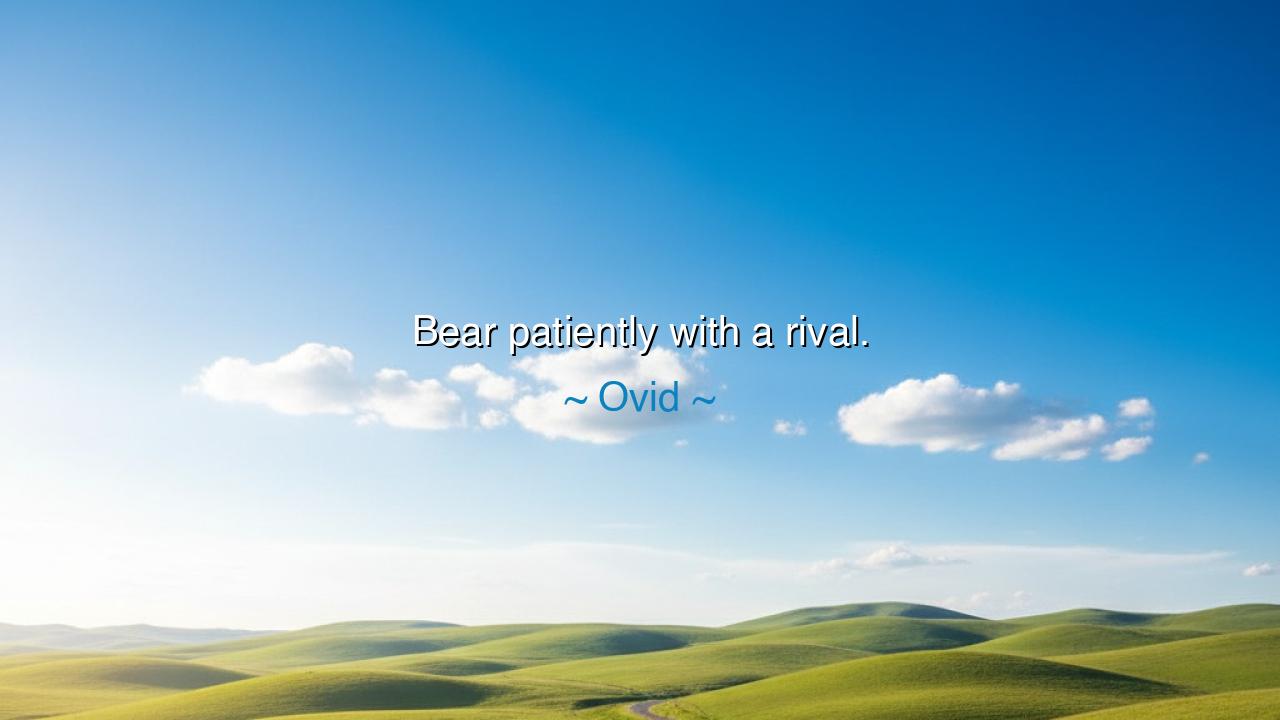
Bear patiently with a rival.






The Roman poet Ovid, whose verses sang of love, longing, and the frailties of human nature, left us this short but piercing command: “Bear patiently with a rival.” Though simple in its phrasing, its meaning carries the weight of centuries, for it touches upon one of the oldest struggles of mankind — the presence of the rival, the other who competes for glory, for affection, or for power. Ovid, steeped in the wisdom of both triumph and exile, teaches that the noblest response is not to rage, not to lash out, but to endure with patience. For in patience lies strength, and in restraint lies victory over the self.
To bear patiently with a rival is no easy task. The rival often awakens within us envy, fear, and anger. Yet Ovid’s counsel reminds us that such passions are destructive when left unchecked. The rival, though an opponent, can also be a silent teacher. By enduring without hatred, we learn the art of self-mastery. By refusing to be consumed by jealousy, we preserve our dignity. True greatness is not measured only by triumph over others, but by triumph over one’s own restless heart.
History provides us with many examples. Consider the rivalry between Thomas Edison and Nikola Tesla. Their contest over electricity — the battle between direct current and alternating current — was fierce and bitter. Edison mocked, Tesla endured, and for years, hostility burned between them. Yet Tesla, though wounded by lack of recognition, bore his struggles with a certain stoic patience, dedicating himself to his work rather than drowning in vengeance. In time, history recognized his genius. Ovid’s words would have reminded both men that the rival’s fire, if borne patiently, becomes the forge in which true greatness is refined.
Even the realm of politics offers lessons. Abraham Lincoln, when running for office, often faced rivals who slandered him mercilessly. Yet he bore them with remarkable patience, refusing to descend into bitterness. In time, he appointed some of these very rivals to his cabinet, transforming opposition into strength. This example shows that to bear patiently with a rival is not to surrender, but to rise above, to turn hostility into alliance, and to prove one’s nobility by refusing to be consumed by petty enmity.
Ovid himself knew rivalry well. As a poet in Rome, he lived among other masters of verse, each competing for favor and recognition. Yet he saw that art was not diminished by rivalry, but sharpened by it. To endure rivals patiently was to allow time to reveal one’s worth. His exile, imposed by Augustus, further deepened his understanding: rivals come not only in human form, but in fate itself. To bear such trials with patience is to live in harmony with destiny, trusting that truth endures beyond momentary contests.
The lesson for us is clear: when confronted with a rival — in work, in love, in life — do not let envy or hatred take root. Recognize that the rival may in fact be sharpening your skills, testing your endurance, and calling forth your hidden strengths. Patience allows the storm to pass, leaving your dignity intact. To attack with fury is to wound yourself, but to endure with calm is to emerge stronger.
Therefore, O seekers of wisdom, remember Ovid’s teaching: “Bear patiently with a rival.” For the rival is not only an obstacle, but a mirror, reflecting your own weaknesses and strengths. Endure with calm, fight with honor, and trust that time will reveal the true victor. In patience lies not passivity, but hidden power — the power to remain unshaken when others burn with envy, the power to rise when others fall to bitterness. This is the way of the ancients, and it is the way to peace, strength, and enduring greatness.






AAdministratorAdministrator
Welcome, honored guests. Please leave a comment, we will respond soon